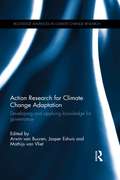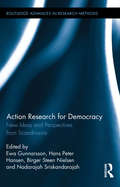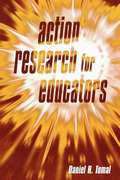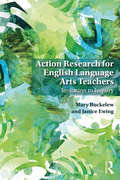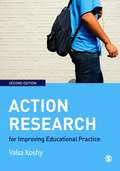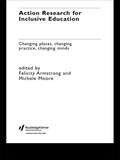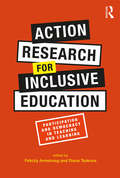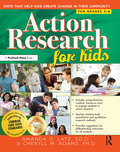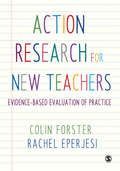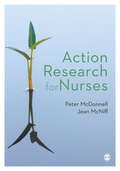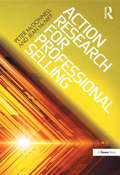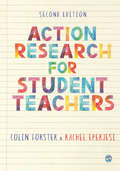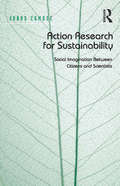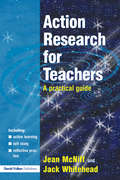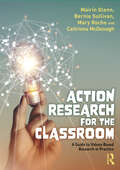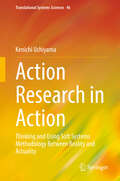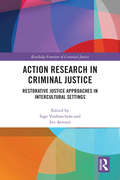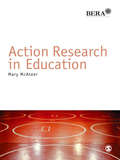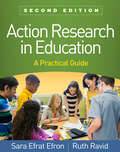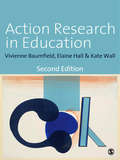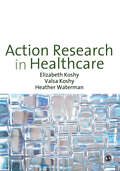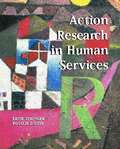- Table View
- List View
Action Research for Climate Change Adaptation: Developing and applying knowledge for governance (Routledge Advances in Climate Change Research)
by Arwin Van Buuren Jasper Eshuis Mathijs Van VlietGovernments all over the world are struggling with the question of how to adapt to climate change. They need information not only about the issue and its possible consequences, but also about feasible governance strategies and instruments to combat it. At the same time, scientists from different social disciplines are trying to understand the dynamics and peculiarities of the governance of climate change adaptation. This book demonstrates how action-oriented research methods can be used to satisfy the need for both policy-relevant information and scientific knowledge. Bringing together eight case studies that show inspiring practices of action research from around the world, including Australia, Denmark, Vietnam and the Netherlands, the book covers a rich variety of action-research applications, running from participatory observation to serious games and role-playing exercises. It explores many adaptation challenges, from flood-risk safety to heat stress and freshwater availability, and draws out valuable lessons about the conditions that make action research successful, demonstrating how scientific and academic knowledge can be used in a practical context to reach useful and applicable insights. The book will be of interest to scholars and students of climate change, environmental policy, politics and governance.
Action Research for Democracy: New Ideas and Perspectives from Scandinavia (Routledge Advances in Research Methods #17)
by Hans Peter Hansen Birger Steen Nielsen Nadarajah Sriskandarajah Ewa GunnarssonContemporary society encounters profound economical, socio-ecological and political crises challenging the democratic foundation of our societies. This book addresses the potentials and challenges for Action Research supporting democratic alternatives. It offers a broad spectrum of examples from Scandinavian Action Research showing different openings towards democratic development. The book’s first part contributes with a wide range of examples such as Action Research in relation to the Triple Helix/Mode II contexts, to design as a democratic process, to renewal of welfare work and public institutions, to innovation policies combining Action Research with gender science. In the second part of the book epistemological and ontological dimensions of Action Research are discussed addressing questions of validity criteria related to Action Research, the transformation of knowledge institutions and the specific character of creativity in Action Research. The book offers a basis for theoretical as well as practical oriented discussions and critical reflections within the field of Action Research and related research orientations, involving a wide range of actors.
Action Research for Educators
by Daniel R. TomalMost research methods are too impractical and painstaking for educators. Teachers and administrators at all levels—elementary, secondary, and university—need a simple, yet powerful book on conducting action research as a viable method for making educational improvements. This user-friendly book covers the principles and history of action research, ethical and legal considerations, how to conduct both formal and informal action research, data collection methods, data analysis and interpretation, planning and initiating action, and evaluating the results of action. Illustrations are included in each chapter.
Action Research for English Language Arts Teachers: Invitation to Inquiry
by Mary Buckelew Janice EwingOffering preservice and inservice teachers a guide to navigate the rapidly changing landscape of English Language Arts education, this book provides a fresh perspective on what it means to be a teacher researcher in ELA contexts. Inviting teachers to view inquiry and reflection as intrinsic to their identity and mission, Buckelew and Ewing walk readers through the inquiry process from developing an actionable focus, to data collection and analysis to publication and the exploration of ongoing questions. Providing thoughtful and relevant protocols and models for teacher inquiry, this book establishes a theoretical foundation and offers practical, ready-to-use tools and strategies for engaging in the inquiry process in the context of teachers’ communities. Action Research for English Language Arts Teachers: Invitation to Inquiry includes a variety of examples and scenarios of ELA teachers in diverse contexts, ensuring that this volume is relevant and accessible to all educators.
Action Research for Improving Educational Practice: A Step-by-Step Guide
by Valsa KoshyWhich topics are right for Action Research in an education context? How do you go about planning a project, collecting and analysing your data? What's the best way to present your research findings to parents, colleagues or funding bodies? Whether you are a busy teacher doing research in your classroom, an undergraduate starting your research project, or a Masters level or education doctorate student writing up your dissertation, this step-by-step guide takes you through every stage involved in carrying out Action Research. In this brand new edition, you will find additional guidance on: - philosophical underpinnings of Action Research - the challenges of being an insider researcher - searching and analysing literature from the internet - children's participation and children's rights in action research projects in educational settings - validity and authenticity in action research - a new chapter on writing for publication - an action research planning sheet. This book draws on Valsa Koshy's extensive experience of supervising researchers at all levels, and includes examples of Action Research carried out by practitioners across a range of topics and age groups. Case studies include UK and international examples, allowing you to reflect on multiple perspectives of Action Research in education. Those new to Action Research, and those looking for a straightforward explanation of the methods involved, will find this book invaluable. Valsa Koshy is Professor of Education and Director of a Research and Development Centre at Brunel University.
Action Research for Inclusive Education: Changing Places, Changing Practices, Changing Minds
by Felicity Armstrong Michele MooreThis book presents and discusses an approach to action research to help reverse discriminatory and exclusionary practices in education. Insider accounts of action research will help challenge assumptions about the limits of inclusive education, and offer examples of how change can be realistically achieved through processes of collaboration and participation. Written by a team of practitioner researchers drawn from a wide range of schools and services, this book addresses a wide range of real-life situations by exploring ways in which teachers have tackled inequalities in the school environment through action research based on principles of equality and democracy. These include: * the co-ordination of services for minority ethnic groups, including refugee and asylum seeking children* young children with autism working with peers in the literacy hour* action research and the inclusion of gay students* developing the role of learning support assistants in inclusion * reducing exclusion of children with challenging behaviour * listening to the voices of young people with severe learning difficulties * developing links between special and mainstream schools * challenging marginalising practices in Further Education.
Action Research for Inclusive Education: Participation and Democracy in Teaching and Learning
by Felicity Armstrong Diana TsokovaExploring practitioner research and the possibilities it creates for increasing student participation and developing inclusive practices in educational contexts, this insightful text presents a range of original and innovative approaches to Action Research, and highlights the critical relationship between educational theory, research and practice in transformative action. Focussing on social constructivist approaches to teaching and learning, Action Research for Inclusive Education offers first-hand insights from researcher-practitioners from international settings including Denmark, Germany, Ireland, Saudi Arabia, Granada, Greece, Singapore and England. Chapters explore diverse participatory and collaborative research practices which draw on the strengths and contributions of teachers and support staff, pupils, and families to foster inclusive practices across the school community and strengthen the participation and independence of all students. Topics considered include collaboration in Participatory Action Research, friendships and the development of students’ social skills, student voice and the role of pupils as co-researchers and peer mentors. Making an important contribution to debates on inclusive education and the role of practitioners and students in bringing about change, this text will be key reading for students, teachers and educational researchers.
Action Research for Kids: Units That Help Kids Create Change in Their Community (Grades 5-8)
by Cheryll Adams Amanda O. LatzAction Research for Kids provides teachers with comprehensive, creative, and hands-on units to engage students in action research. Students will benefit from learning about quantitative and qualitative research practices that can make a real difference in their lives and those within their communities. Within this text, teachers can select a lesson or use whole units as students explore research methods such as survey research, experimental research, life history, and photovoice in fun lessons that ask them to create a library wish list, interview people in their communities, lobby for cookies in the cafeteria, and experiment with preservatives. Each lesson comes with detailed instructions and ideas for differentiation. Grades 5-8
Action Research for New Teachers: Evidence-Based Evaluation of Practice
by Colin Forster Rachel EperjesiAction research is a popular part of many teacher training courses, but understanding how to do it well isn’t always straightforward. Action Research for New Teachers breaks the process down into small steps giving you concise, jargon-free guidance on all the issues and key considerations that you will need to tackle. It focuses on being evidence-based, encouraging you to produce evidence-rich research projects that are methodologically sound and stand up to scrutiny. This book takes you through the initial stages of planning and research design, engages with the complexities of data collection, and gives you advice on analyzing your data and writing up your research project.
Action Research for New Teachers: Evidence-Based Evaluation of Practice
by Colin Forster Rachel EperjesiAction research is a popular part of many teacher training courses, but understanding how to do it well isn’t always straightforward. Action Research for New Teachers breaks the process down into small steps giving you concise, jargon-free guidance on all the issues and key considerations that you will need to tackle. It focuses on being evidence-based, encouraging you to produce evidence-rich research projects that are methodologically sound and stand up to scrutiny. This book takes you through the initial stages of planning and research design, engages with the complexities of data collection, and gives you advice on analyzing your data and writing up your research project.
Action Research for Nurses
by Jean McNiff Peter McDonnellNurses work in complex situations with daily challenges, where the needs of each patient represent unique demands. Action research helps nurses to investigate their practices as reflective practitioners, allowing them to ask ‘What is going on? How do we understand the existing situation? How do we improve it?’ This book supports nurses in investigating their own professional practices in order to develop the new insights and approaches: · embodying holistic perspectives in dialogical and relational forms of individual and organisational learning, · equal emphasis on processes and outcomes; · welcoming all participants’ contributions , and listening to all voices; · developing a patient-centred focus where people are involved in their own healing; · building communities of enquiring practices. This book is intended for undergraduate student nurses, qualified practising nurses in clinical settings who may or may not be engaged in formal professional education courses and nurse educators and managers.
Action Research for Nurses
by Jean Mcniff Peter McdonnellNurses work in complex situations with daily challenges, where the needs of each patient represent unique demands. Action research helps nurses to investigate their practices as reflective practitioners, allowing them to ask 'What is going on? How do we understand the existing situation? How do we improve it?' This book supports nurses in investigating their own professional practices in order to develop the new insights and approaches: · embodying holistic perspectives in dialogical and relational forms of individual and organisational learning, · equal emphasis on processes and outcomes; · welcoming all participants' contributions , and listening to all voices; · developing a patient-centred focus where people are involved in their own healing; · building communities of enquiring practices. This book is intended for undergraduate student nurses, qualified practising nurses in clinical settings who may or may not be engaged in formal professional education courses and nurse educators and managers.
Action Research for Professional Selling
by Jean McNiff Peter McDonnellAction Research for Professional Selling by Peter McDonnell and Jean McNiff is for people working, or hoping to work in sales, who wish to improve their capacity for selling, and who may be involved in providing or participating in a structured sales training programme. It provides a basis for professional selling that connects the sales process to different philosophical models for understanding human interactions and contains much practical advice for selling in a tough economic environment. Action research is used across the professions as a powerful methodology for improving performance and outcomes and will enable sales practitioners to generate their practical theories of selling. The book answers calls for evidence-based practice in sales education, placing special emphasis on the strength of a values-based approach over the outmoded manipulative models of the past (many of which are still in evidence). It is essential to develop your understanding of what you are doing, and be able to explain it, and the book shows you how to do this through researching your practice in action. It focuses seriously on selling as a field of research offering an innovative, practical approach to selling, underpinned by strong theoretical and philosophical frameworks.
Action Research for Student Teachers
by Colin Forster Rachel EperjesiAction research is a popular part of many teacher training courses but understanding how to do it well is not always straightforward. Previously known as Action Research for New Teachers, this book will guide you through each step of the process, from initial stages of planning and research, through to how to analyse your data and write up your research project. This second edition includes: · A new ‘Critical task’ feature, with suggested responses · Discussion of where action research ‘fits’ in the word of education research · Exploration of the skills and attributes needed for undertaking action research · Guidance on how to write with clarity and purpose.
Action Research for Student Teachers
by Colin Forster Rachel EperjesiAction research is a popular part of many teacher training courses but understanding how to do it well is not always straightforward. Previously known as Action Research for New Teachers, this book will guide you through each step of the process, from initial stages of planning and research, through to how to analyse your data and write up your research project. This second edition includes: · A new ‘Critical task’ feature, with suggested responses · Discussion of where action research ‘fits’ in the word of education research · Exploration of the skills and attributes needed for undertaking action research · Guidance on how to write with clarity and purpose.
Action Research for Sustainability: Social Imagination Between Citizens and Scientists
by Jonas EgmoseHow can action research further new research orientations towards sustainability? This book, empirically situated in the field of upstream public engagement, involving local residents, researchers and practitioners in bottom-up processes deliberating on urban sustainability, answers this question by analysing processes of social learning. The book addresses the need to move towards sustainability at societal level as a democratic challenge questioning the way we live on planet earth. By conceptualising sustain-ability as an immanent and emergent ability of ecological and social life, continuously to renew itself without eroding its own foundation of existence, it argues that since sustainability cannot be invented but only supported (or eroded) by science, we need to reframe science in the role of sustaining sustain-ability. Through analyses of a three year action research programme, aiming to provide local citizens with a greater say in the future of urban sustainability research, this book shows how action research can make important methodological contributions to processes of social learning between citizens and scientists by enabling free spaces in peoples everyday life and within academia, where aspects of un-sustainability can be addressed and new imaginations of more sustainable futures emerge.
Action Research for Teachers: A Practical Guide
by Jack Whitehead Jean McNiffAssuming no prior knowledge of research methods and techniques, this book is the perfect companion for teachers at all levels undergoing professional development who need to enhance their formal reflection skills. Providing a detailed explanation of what action research is and its importance in terms of whole school development, this book invites the teachers to try out educational research for themselves and adopt an investigative attitude that will help improve and evaluate practice. It includes: * Support and guidance that help you tackle key issues * "Real-life" practical case studies that underline what action research is and how it can be effectively used.
Action Research for the Classroom: A Guide to Values-Based Research in Practice
by Caitriona McDonagh Mary Roche Bernie Sullivan Máirín GlennWhat is action research? Why does it matter in education? This practical and accessible book provides answers to these questions, guiding readers through a meaningful and manageable approach to research in practice. Readers will benefit from guidance on easing the stress of research projects in teacher education courses, professional development initiatives and in school self-evaluation. Supported by case studies from teachers’ and student teachers’ practice, chapters guide readers through key aspects of carrying out a research project, including: planning a research project collecting and using data presenting evidence generating theory writing up and disseminating your research a theoretical rationale to show why the research is conducted in this way Written in an accessible manner by experienced classroom teachers and academic researchers, this is an essential read for those conducting research on their own practice as part of their professional learning. Action Research for the Classroom shows how teacher research is drawn from the reality of busy life in the classroom and that it can be undertaken in the most complex learning environments, creating positive change for teaching and learning.
Action Research in Action: Thinking and Using Soft Systems Methodology Between Reality and Actuality (Translational Systems Sciences #46)
by Kenichi UchiyamaThis is the first book to provide the fundamental backbone for the field of action research (AR). One of the main characteristics of AR is to achieve a kind of learning based on experience through action in the real world, connecting and reconciling theory and practice by reflection for / in / by action. A standard form of AR has not yet been found, however, because it is difficult for conventional academicians to effectively bridge the gap between objectivity in theory and subjectivity in practice. For the past 50 years, soft systems methodology (SSM) has developed the methodology to deal with subjectivity by rigorously adhering to a coherent guideline of a systemic means for discussion— for example, accommodation (i.e., living with different individual worldviews). The author began to reinterpret SSM from an Eastern context at Lancaster University (UK), and received a Ph.D. at the London School of Economics, introducing the &“actuality&” point of view. This idea originated with the eminent Japanese psychiatrist Bin Kimura, who argued that schizophrenics do not lose touch with reality but with actuality. That is, there are two aspects of the world, reality and actuality, based on Latin res (&“thing&”) and actio (&“action&”). They can recognize all things of the world as &“reality&” as expressed by that noun but cannot comprehend with a feeling of reality the predicate &“actuality&”. Introducing actuality into SSM as a new dimension opened a new perspective in SSM both theoretically and practically. This topic is discussed in detail in Part II of this book. Part I contains three chapters. Chapter 1 provides a basic conceptual overview of SSM. Chapter 2 provides an actual trace of the evolution of SSM over the last 25 years. One topic that is expected to become the subject of serious practical application of SSM in the future is its application to resilience. This is discussed in some detail in Chapter 3. The actuality aspect of SSM has been used for more than 20 years in various contexts, yielding many good results. Among those are a new explanation of accommodation using paleo logic or predicate logic; a new management cycle based on actuality, such as learning for / in / by action; and the novelty of the methodological tool itself. Those 20 years of learning authenticate the guideline for the way of discussion or agreement that is relevant to actuality. Especially in the recent Covid-19 pandemic, it has oriented the restoration of actuality in the digital-based society, where actuality is deadened. This result is also dealt with in Part I.
Action Research in Criminal Justice: Restorative justice approaches in intercultural settings (Routledge Frontiers of Criminal Justice)
by Inge Vanfraechem and Ivo AertsenTo understand how people experience justice and security is a challenging task in times of unrest, marked by growing perceptions of insecurity, discrimination and uncertainty. The European project ALTERNATIVE aimed to understand justice and security experiences related to conflicts in intercultural settings, when citizens are given the means to actively contribute to these processes. This book relates how the project was set up as an action research through the concrete description of four action sites: social housing estates in Vienna, Austria; a small community in Hungary with a Roma population; three border towns in Serbia; and three communities in Northern Ireland. These four sites have been compared through an innovative methodology, which leads to a deeper understanding of the impact of participatory and restorative justice oriented processes, and - in a more general way - of what action research may entail in the criminological field. Bringing together researchers and case studies from around Europe, this book examines the scientific potential of action research as a methodology in criminal justice settings. This book is one of two volumes resulting from the work by a group of researchers in six European countries having cooperated intensively during four years in ALTERNATIVE, an action research project funded under the EU Seventh Framework Programme.
Action Research in Education (BERA/SAGE Research Methods in Education)
by Mary Mcateer'This structured and accessible book, with excellent case studies, will give confidence to anyone embarking on an action research project'-Professor Ken Jones, Dean of Humanities, Swansea Metropolitan University 'Masterly in its lucidity, this text contextualises Action Research in the fiedl of Education Practice; and is therefore a valuable resource in both professional learning and improved professional practice'-Effie Maclellan, Research Professor in Education, University of Strathclyde, Glasgow 'An engaging, clearly written, and helpfully structured articulation of how AR can be implemented and practised in order to make a difference within educational contexts'-Dr Stephen Parker, University of Worcester 'Will assist practitioner researchers to develop a profound and critical understanding of this approach'-Professor Marion Jones, Liverpool John Moores University This hands-on and user-friendly book uses illustrative case studies to demonstrate and explore the potential for change in real social situations. This book seeks to assert the academic integrity of action research and to de-mystify the process. Each chapter includes: - a 'how to' section based on concrete examples and dilemmas - commentary that relates examples to the broader field - a discussion of the underlying theoretical approach - discussion and exploration of quality issues - discussion of ethical and pragmatic decision-making The mix of theoretical grounding and focus on real issues will be of benefit to Master's level or advanced undergraduate students on Education and Research Methods courses or those undertaking Action Research as part of professional development activities. Mary McAteer is Director of the Mathematics Specialist Teacher (MaST) programme at Edge Hill University Research Methods in Education series: Each book in this series maps the territory of a key research approach or topic in order to help readers progress from beginner to advanced researcher. Each book aims to provide a definitive, market-leading overview and to present a blend of theory and practice with a critical edge. All titles in the series are written for Master's-level students anywhere and are intended to be useful to the many diverse constituencies interested in research on education and related areas. Other books in the series: - Using Case Study in Education Research -Qualitative Research in Education, Atkins and Wallace - Ethnography in Education, Mills and Morton For more about the series and additional resources visit the BERA/SAGE series page here.
Action Research in Education, Second Edition: A Practical Guide
by Sara Efrat Efron Ruth RavidAcclaimed as a text and professional development tool, this user-friendly resource has now been revised and updated, and offers expanded coverage of collaborative action research (CAR) and participatory action research (PAR). Preservice and inservice educators get crucial step-by-step guidance for conducting classroom- and school-based studies to improve their instructional practices. Organized to mirror the full cycle of action research, the book provides balanced coverage of qualitative, quantitative, and mixed methods approaches. Vivid vignettes and examples illustrate research approaches for a range of teaching and learning situations, school subjects, and age groups (PreK–12). Readers learn how research approaches are driven by the research question, as well as how to develop data collection strategies; design and/or evaluate assessment tools; interpret, analyze, report, and implement study results; and design a new cycle of research that builds on the previous one. New to This Edition *In-depth descriptions of CAR and PAR--which enable groups of teachers to work together to solve problems in a classroom or school--plus examples of both throughout the book. *Expanded or new discussions (with examples) of such topics as how research approaches and methods are driven by the research question, how to assess different types of reliability and validity, the differences between analysis and interpretation, and how to use sequential cycles of research for continuous improvement and professional development. *Fully updated references and resources. Pedagogical Features *Both individual and group exercises and activities in every chapter. *New and updated checklists and guidelines that enable busy educators to self-assess the progress and quality of their studies. *Sample templates to assist in development of research instruments. *Example boxes illustrating the components of an action research report. *Summary tables highlighting key aspects of different research strategies. *Chapter summaries (now shorter for ease of use) and suggestions for further reading.
Action Research in Education: Learning Through Practitioner Enquiry
by Elaine Hall Kate Wall Vivienne Marie BaumfieldAction Research in Education is an essential guide for any lecturer, teacher or student-teacher interested in doing research. This exciting new edition of a popular text is an important resource for any education professional interested in investigating learning and teaching. Building on the success of Action Research in the Classroom, the authors have revised, updated and extended this book to include examples from further and higher education. It maps out easy-to-follow steps for usefully applying an action research approach and is full of practical tips and examples of real practitioner research projects from a range of schools, colleges and universities. This book will help teachers to: - understand and apply practitioner inquiry - enhance their problem-solving skills - locate their own activity in a wider context - maximise opportunities to develop practice - evaluate the needs of their learners Clear, pragmatic and timely, this is a must-have text for all teachers and students of education. Vivienne Baumfield is Professor of Pedagogy, Policy and Innovation in the School of Education, University of Glasgow Elaine Hall is Lecturer in Research Methods, School of Education, Communication and Language Sciences, Newcastle University Kate Wall is Senior Lecturer in the School of Education, Durham University
Action Research in Healthcare
by Heather Waterman Dr Elizabeth Koshy Dr Valsa KoshyAction Research in Healthcare is a practical guide to using research for improving practice in healthcare contexts. As an increasingly popular method of inquiry, action research is widely used in healthcare to investigate professional practice and patients' experience while simultaneously: - introducing innovations - planning, actioning and evaluating new ideas - seeking to improve patient care - working collaboratively. Taking you through the process step-by-step, Action Research in Healthcare explains how to tackle each stage of your project - from planning the study and undertaking a literature review, through to gathering and interpreting data and implementing findings. Examples of action research projects are included throughout to illustrate how the method works in practice. Action Research in Healthcare assumes no previous knowledge of the subject and is the ideal resource for anyone about to start or already involved in a project.
Action Research in Human Services
by Ernie Stringer Rosalie DwyerAction Research in Human Services presents an approach to action research that assists human service professionals to improving their practice. Though the action research processes articulated in this book may be used effectively with individuals, they are particularly relevant to work with groups, families, and communities. Action research is suited to a wide range of human services work--child protection, family support, domestic violence, juvenile justice, corrections, youth work, aged care, rehabilitation, community work, community development, services to the disabled, and others. Ultimately, action research enables human service professionals to work in partnership with clients, community groups, colleagues, and others to explore significant issues and to take therapeutic action to resolve problems.
